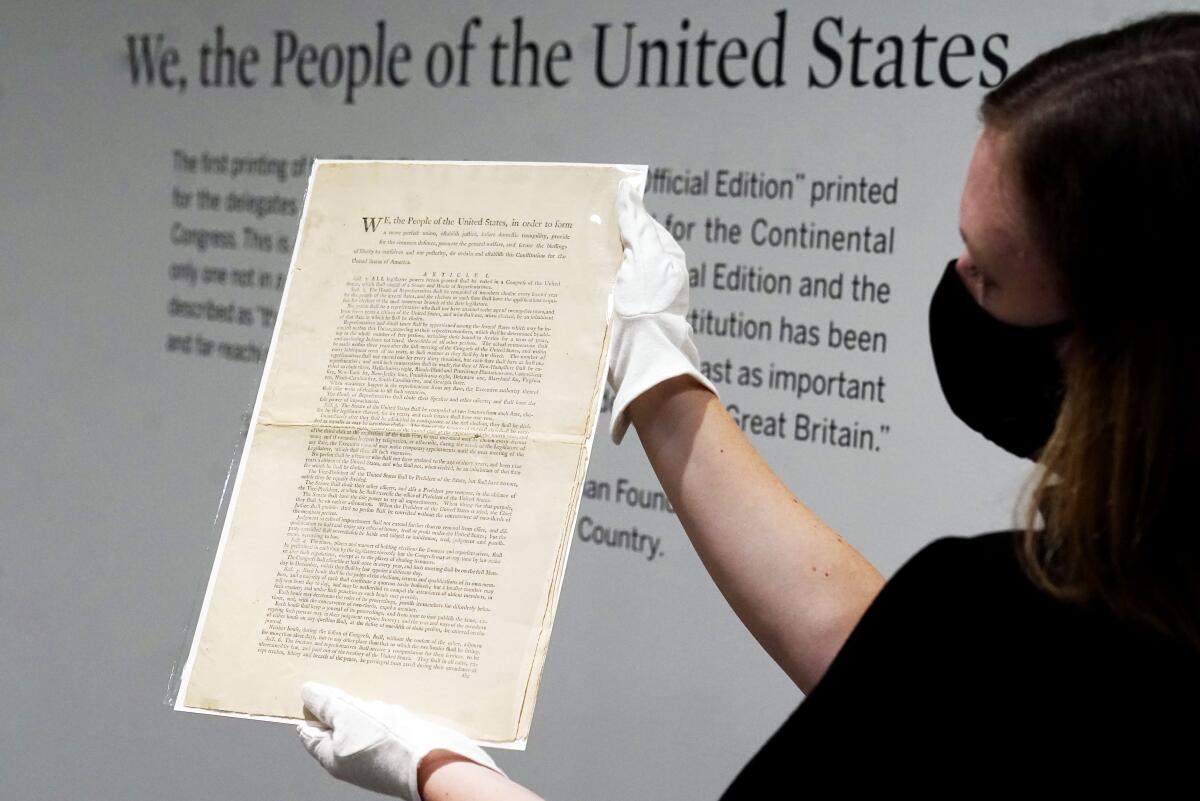Letters to the Editor: The Constitution is flawed, but it works. Changing it invites upheaval

- Share via
To the editor: I agree with columnist Nicholas Goldberg that holding a constitutional convention would be the wrong way to fix the flawed Constitution, particularly in our chaotic times.
I would go a step further. We should not be changing the Constitution, even when better times arrive.
The essence of our Constitution (and law in general) is not its inherent goodness, but its ability to maintain the social order. Successful societies of the past prospered with the creation of written laws, some of which we today see as absurd or unfair.
One can argue with Goldberg about whether giving tiny states the same number of senators as California or Texas is wrong, but we should be careful about making that into a Constitutional project. The framers knew what they were doing by making changing the Constitution very hard.
Jack Kaczorowski, Los Angeles
..
To the editor: Goldberg wonders whether his fear that a new constitutional convention could endanger the separation of church and state is a worst-case fantasy. It’s not. His fear is justified.
He further points out that delegates to such a convention would very likely be appointed by state Legislatures, the majority of which favor right-wing policies. A constitutional convention could rewrite or discard any provision of the Constitution.
The framers in the 1780s were far more determined to protect the equal rights of conscience of everyone, whether believer or nonbeliever, than the religious right wingers who would probably make up a majority of the delegates to a present-day convention.
Secular Americans never want more rights than anyone else. We just don’t want fewer rights. Can our religious right counterparts provide the same assurance of supporting equal rights for all?
Edward Tabash, Los Angeles
The writer, an attorney, chairs the board of directors of the Center for Inquiry.
..
To the editor: Article V of the Constitution sets forth the mechanism of amending it and guarantees equal suffrage of the states that cannot be revoked without their permission. Thus, unfortunately, this undemocratic feature of the Senate effectively cannot be amended.
It’s also worth noting that it takes two-thirds of the House and Senate to propose an amendment, and three-fourths of the states to ratify it. Thus, eliminating the electoral college will not happen because there are more than enough small states to prevent ratification.
Lastly, the high bar to amend the Constitution would prevent the 2nd Amendment from ever being modified or eliminated. So sadly, there’s little to no chance of any of these reforms being enacted.
Gregory Palermo, Carpinteria
..
To the editor: I hate to disagree with Goldberg, but the changes he seeks to the Constitution would be a disaster.
First, abolishing the electoral college would let large states like New York and California effectively run the country, with no say from small states.
Second, if I don’t like the actions of the government and want to protest in the street, I should still be able to carry a gun without law enforcement taking it away.
Finally, tiny Wyoming should have the same representation in the U.S. Senate as California — two senators. It should have the same relevance as bigger states.
Jacquie Mahoney, Claremont







